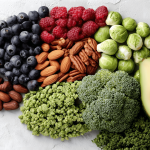
5 Best Brain Boosting Foods
May 31, 2025
What happens if you take an Omega-3 Supplement for 30 days
July 6, 2025Want to unlock sharper focus, a steel-trap memory, and a brighter mood?
While a well-rounded diet is key, certain vitamins play starring roles in keeping your brain performing at its peak.
If you’re looking to clear away brain fog and elevate your mental game, you’re in the right place.
Ensuring you get enough of these specific vitamins can lead to noticeable improvements in your cognitive abilities.
Now, let’s dive into 5 amazing brain-boosting vitamins you should be focusing on.
Number 1: The B Vitamin Complex
The B-vitamin family is critical for brain health, contributing to a wide array of vital biochemical reactions necessary for optimal cognitive function.
B vitamins, particularly B12, B6, and B9, are critical for numerous brain processes. They help produce energy in brain cells, synthesize vital neurotransmitters, and break down homocysteine, an amino acid that, at high levels, is linked to an increased risk of cognitive decline and dementia.
Deficiencies in these B vitamins, especially B12 and B9, have been clearly linked to cognitive impairment, memory problems, and mood disturbances, particularly in older adults.
A study of mixed B vitamin intakes found that higher combined dietary levels of several B vitamins were significantly associated with better global cognitive function and interacted positively with genes linked to brain health pathways like apoptosis and Alzheimer’s disease.
For B12 vitamins, include animal foods like meat, fish, and eggs in your diet. Vegans should choose B12-fortified foods or supplements. For Vitamin B6, eat items like chicken, fish, and bananas. To get more B9, eat plenty of leafy green vegetables, legumes like lentils, and avocados.
By the way, if you are interested in learning how to boost your brain with proper nutrition and supplementation, check out our 12-week brain boost system, link in the description.
Number 2: Vitamin D
Often known for its role in bone health, Vitamin D is also emerging as a key player in brain function and mental well-being.
Your brain has Vitamin D receptors widespread throughout its tissue, indicating its importance.
Vitamin D is thought to play a role in neuroprotection, regulating inflammation, supporting mood, and aiding in the clearance of amyloid-beta.
Low levels of Vitamin D have been associated in numerous observational studies with an increased risk of cognitive decline, dementia, and mood disorders like depression.
A 12-month randomized, placebo-controlled experiment with elderly individuals experiencing Mild Cognitive Impairment (MCI) found that daily Vitamin D supplements significantly improved their overall thinking abilities compared to a placebo.
Your body makes most of its Vitamin D from safe, short periods of daily sun exposure. You can also get some Vitamin D by eating foods like fatty fish, egg yolks, and fortified items like certain milks or cereals. However, if you don’t get much sun taking a Vitamin D supplement is often necessary to get enough.
Number 3: Vitamin C
Vitamin C is a potent antioxidant found in high concentrations in the brain. It helps protect brain cells from oxidative stress caused by free radicals, which can damage cells and contribute to aging and neurodegenerative diseases.
It’s also involved in the synthesis of neurotransmitters like norepinephrine, which is important for attention, and plays a role in modulating the activity of other neurotransmitters.
Studies have shown that higher blood levels of Vitamin C are associated with better performance on cognitive tasks, including memory and attention.
A systematic review of 50 studies showed that people with good thinking skills generally had higher Vitamin C levels than people with thinking problems.
To get enough Vitamin C, eat colorful fruits and vegetables like oranges, berries, kiwi fruit, bell peppers, broccoli, and leafy greens.
Number 4: Vitamin E
Vitamin E is a fat-soluble antioxidant that plays a critical role in protecting your brain’s delicate cell membranes.
The brain is particularly rich in fats and uses a lot of oxygen, making it highly susceptible to oxidative damage.
Deficiency in Vitamin E can lead to neurological problems, and some research suggests that adequate intake may help protect against age-related cognitive decline.
A study following older adults for over five years found that those who ate less Vitamin E were significantly more likely to develop dementia and experienced a faster decline in their thinking skills.
To get enough Vitamin E, include foods like nuts, seeds like sunflower and pumpkin seeds. You’ll also find Vitamin E in broccoli, and avocados.
Number 5: Choline
While sometimes grouped with B-vitamins, choline is a distinct essential nutrient crucial for brain development and lifelong cognitive function.
Adequate choline intake throughout life is associated with better memory performance and protection against age-related cognitive decline.
A study involving 1391 dementia-free adults from the Framingham Offspring cohort found that higher current dietary choline intake was associated with better verbal and visual memory performance, while higher choline intake measured years earlier was linked to significantly less white-matter hyperintensity (a marker of brain aging or damage).
To ensure you get enough Choline, include egg yolks in your diet, which are a very rich source, along with beef liver. You can also find good amounts in fish like salmon and cod, other meats such as chicken and beef, as well as plant-based options including soybeans and soy products (like tofu and soy milk), and cruciferous vegetables such as broccoli and cauliflower.
